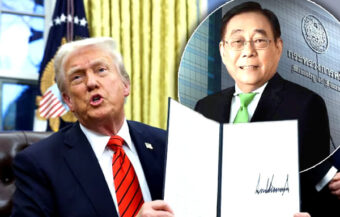Ung Ing takes charge as business leaders are buoyed by the retention of Pichai Chunhavajira and his team. All eyes will be on the new government’s economic policy amid a fast-rising baht. With the stronger currency impacting exports and tourism, fiscal policy and investment decisions by the new government are crucial for stability and even maintaining marginal growth.
The Thai baht made a resounding comeback against the US dollar in the last week. In short, it ended last week 9.81% up on the dollar since May 1st. The rise comes with a sea change in financial sentiment sparked by weakening US data. Suddenly, funds are flowing back to Asia, with a recovery seen in Bangkok’s Stock Exchange of Thailand (SET). However, the Thai economy has a widening range of structural problems. The latest is the loss of competitiveness impacting its badly damaged manufacturing sector. At length, the economy is expected to eke out growth of 2.5% in 2024. Certainly, this is a whole percentage point behind where it should be, according to Deputy PM and Minister Pichai Chunhavajira. Meanwhile, Bank of Thailand Governor Sethaput Suthiwartnarueput also warns of headwinds closing out a difficult year.

The Thai baht gained ground sharply during the last week as US economic data finally showed definitive signs of a weakening economy. In short, the data was stark and, in addition, came with a revised figure on job creation.
Significantly, this showed over eight hundred thousand jobs being wiped off previous job creation data.
The impact was quick and robust, with Federal Reserve Chairman Jerome Powell immediately indicating that the time had come to drop interest rates. In turn, market analysts are now suggesting three interest rate cuts in a row in September, October, and December.
In Thailand, the baht has gained 9.81% against the US dollar from May. Previously at that date, it was worth ฿37.21 to the greenback but closed on Saturday at ฿33.55.
Bank of Thailand reassures the public amid economic growth and concerns over investment trends
The movement on the baht brought Bank of Thailand Governor Sethaput Suthiwartnarueput to assure Thais that the central bank was monitoring the situation.
Thailand’s economy grew 1.6% in the first quarter, and a positive second-quarter report recently released by the National Economic and Social Development Council (NESDC) shows 2.3% growth in the second period.
Nonetheless, top economists are warning that there were worrying signs in the last set of data, particularly a fall of 6.2% in private investment as well as ongoing concerns about the impact of slow public investment spending.
Significantly, this comes despite assurances from the government disbursement office that it is aiming for between 78-80% disbursement of the 2024 budget by September 30th.
Political instability raises concerns over delayed government functions impacting economic growth
In short, there have been concerns about the political interruptions caused by the removal of Prime Minister Srettha Thavisin on August 14th. At this time, the prospect of a fully functioning government may have to wait until the third week in September.
Speaking recently at a conference, the Minister of Finance Pichai Chunhavajira warned that continued low growth risks Thailand entering a crisis. The minister, who along with his economic team is expected to be retained by Prime Minister Paetongtarn Shinawatra, suggests the economy will see 2.5% growth this year.
At the same time, the Bank of Thailand predicted 2.6% growth but acknowledged the ongoing tightening of credit. In short, this is the central bank’s response to elevated private sector debt levels.
Meanwhile, banks are reining in credit lines, particularly to small and medium-sized business concerns.
Thailand’s manufacturing sector suffers from low competitiveness and reduced contribution to output
In short, according to Minister Pichai, Thailand’s manufacturing base, which normally accounts for 70% of economic output, is being eroded. Certainly, we are seeing this with low-cost Chinese dumping.
However, from a wider perspective, the country’s manufacturing sector is no longer able to meet international demands.
For this year, Mr. Pichai suggests that it means the growth rate will be a full 1% point less. Similarly, the manufacturing sector has fallen to 65% of economic output.
In the meantime, the baht is tipped to appreciate further before the end of the year. For instance, it normally strengthens in the last quarter with a peak in foreign tourism arrivals. However, the end-of-week value of ฿33.55 to the dollar is already well ahead of estimates seen only a week ago.
Stronger baht sparks optimism despite concerns over the outlook for exports but inflation data is encouraginbg
Previously, there was confidence that the stronger baht would not impede export performance. At the same time, the Central Bank’s Monetary Policy Committee predicts moderate inflation for the year to be just 0.6%. Certainly, this would be well below the 1-3% policy target range.
Ung Ing takes charge as business leaders focus on who will be Finance Minister and economic policy
Meanwhile, Governor Sethaput has dismissed any concerns about deflation. The central banker pointed out that even with lower prices in some areas, consumers still continued spending.
Economic data shows healthy consumer purchasing power despite the hawkish lending environment. Mr. Sethaput explained the sharp rise in the baht was linked to the strong economic data stateside predicting a downturn.
In turn, this caused a weakening of the dollar as interest rate reductions are on the cards. Therefore, the price of gold strengthened, which has a notably pronounced impact on the value of the baht.
Furthermore, the uncertainty about US politics and the very contentious November 5th General Election in America is predicted to keep the US dollar weak.
Central bank calls for flexible interest rate policy amidst global economic instability and concerns over exports
The Thai central bank boss said a flexible interest rate position was needed. He warned that the international economy is presently unstable. At the same time, the higher baht will adversely affect exports and foreign tourism income in the last four months of 2024.
All eyes are on the Federal Reserve in September, with some analysts predicting 0.5% interest rate drops as opposed to 0.25% cuts. In addition, the flow of negative economic data and US economic weakening signals themselves have seen funds flowing back towards Asia.
In Thailand, this has coincided with the new Shinawatra-led government and long-awaited gains in the Stock Exchange of Thailand (SET). The index moved to end the week at 1,359. However, this was still down some 4.01% for the year and a full 12.96% down from this time last year.
Join the Thai News forum, follow Thai Examiner on Facebook here
Receive all our stories as they come out on Telegram here
Follow Thai Examiner here
Further reading:
Ung Ing takes charge as business leaders focus on who will be Finance Minister and economic policy
Most business executives see GDP growth of less than 2% in 2024 as ministers meet without the PM
Thailand finds itself facing economic and political turmoil. Top economist warns of trouble ahead
Inward immigration may ultimately be the only thing that can halt Thailand’s fated economic decline
Thailand’s days of GDP growth in excess of 5% may be a thing of the past as it has grown too old
Cabinet in pension move as the number of working Thais to over 60s is set to half in 20 years
Thailand’s new move to boost the birth rate and fight the negative impact of an ageing population
Denmark and Thailand seek economic partnership and face the same challenge – demographics
Thailand’s new move to boost the birth rate and fight the negative impact of an ageing population
BCG economic and social blueprint over the next 5 years unveiled, promises more money for less
Noble spirit of Thailand’s elderly helps country deal with demographic problem


















